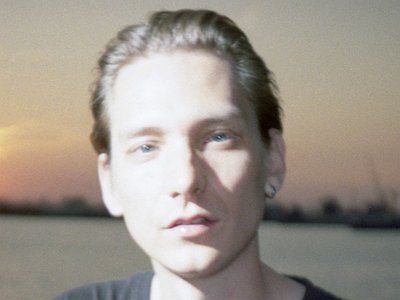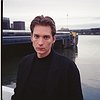Part 2
Could you take us through a day in your life, from a possible morning routine through to your work? Do you have a fixed schedule? How do music and other aspects of your life feed back into each other - do you separate them or instead try to make them blend seamlessly?
Until a few years back I was only interested in making music. Somehow a very linear way of living and thinking, and it continued until I grew unhappy and frustrated with it. In case of any setback you are at loss because your ‘whole life’ depends on it. Finding love, on different levels, and surround myself with people who constantly challenge me, a previously unimaginable balance started to influence the music. A perfect day now means doing whatever research I want to do during the day, and start work after dinner. No chatter on the phone, or during the day, just surround myself with research. I can go on like these days on end and the thought of it makes me happy and calm.
Could you describe your creative process on the basis of a piece or album that's particularly dear to you, please? Where did the ideas come from, how were they transformed in your mind, what did you start with and how do you refine these beginnings into the finished work of art?
Working on my latest album I wanted to find a way to make music a space to observe and improvise and write words like strokes of paintbrushes.
There are many descriptions of the ideal state of mind for being creative. What is it like for you? What supports this ideal state of mind and what are distractions? Are there strategies to enter into this state more easily?
I have to be gentle with myself, allow time to make and reflect. That means spending days doing nothing but research. I have this thing before I go to sleep which is called Rocking Syndrome, where I rock my head back and forth. Some children have it, but occasionally it extends into your adult life. Although it’s not always pleasant I create a lot of my music in this so called half-sleep. Endorphins are created in my brain when I do it and often I only need my phone ready to record. When the idea is really good I can force myself out of this slumber and record my ideas. If I don’t allow this time for myself, I create a lot less and it piles up inside of me, resulting in discomfort.
How is playing live and writing music in the studio connected? What do you achieve and draw from each experience personally? How do you see the relationship between improvisation and composition in this regard?
During the confinement we saw many artists give live concerts on the internet. I am not interested in the illusion of reality. A concert on the internet is contrary to the principle of the concert, namely to come together, to have a direct interaction with the artists, danger. I can say that I make music for the almost religious and meditative feeling that performing gives me. It is one of the rare moments where I am fully emerged in the present. I am convinced that we should use this time to test alternative shared experiences. I have used my shows to take studio ideas further. By playing live you take your foot off the brake pedal and you can see where the live energy takes you.
How do you see the relationship between the 'sound' aspects of music and the 'composition' aspects? How do you work with sound and timbre to meet certain production ideas and in which way can certain sounds already take on compositional qualities?
A great question. To answer this I would like to describe the process of Love, Disorderly. I feel my head is full with images, from the news, the internet and the world in general feels like a messy and non-narrative collage. I wanted to record this, sensical or non sensical.
When my friend Obi Blanche sent me the guitar noise for Love, Disorderly I felt uneasy. It made me feel uncomfortable, like a dying beast screaming in pain, chaos I feel inside of me, chaos I see around me. My girlfriend Ellen Treasure who is responsible for all the visual parts of my work, urged me to work on it, maybe also for its visual quality. I managed to capture obi’s improv again, composed the orchestra around it like piercing strings that swell into a chaotic climax. The composition and songwriting is the texture of the guitar, it mirrored the exact angsty feeling I felt in 2019 and mirrored it. Composing the orchestra around this brutal noise was a way for me to make sure what we’re doing here is not a mistake. It’s meant this way. It’s not only a ‘noise’.
Our sense of hearing shares intriguing connections to other senses. From your experience, what are some of the most inspiring overlaps between different senses - and what do they tell us about the way our senses work? What happens to sound at its outermost borders?
My interest lies in the audio visual. The idea of a regular music video, a concept that has been around since the 1950s and has hardly changed, feels dated. Still, the visual identity of my work is my main tool for creating my own world and people are increasingly listening to music online with their eyes.
The online platforms show my work on iPhone screens or laptops. I want to participate in this system and use the possibilities that the internet has to offer, but at the same time I want to continue exploring shared experiences of an event or exhibition. I am thinking of concerts, performances, gallery screenings or a screening in a cinema. Viewing a video or a performance in a room is a very different experience to looking at it on a phone.
Art can be a purpose in its own right, but it can also directly feed back into everyday life, take on a social and political role and lead to more engagement. Can you describe your approach to art and being an artist?
There is a first emotional layer which we can all understand on a subconscious level, we feel it or not. We can feel empathy with a protagonist. The hair on our arms can stand right up when a string section hits you, or when the singer cries in your ear. The second and third layer can be socio-political. I want to research and use classical and experimental ways of working in my pop music. Some inspiring examples are Nick Cave, Scott Walker, Brian Eno, Baxter Dury, "Rights for gays" - John Maus. By not classifying myself I can be freer and more creative, by borrowing tools from other genres, I focus on a more timeless quality and make room in my music to discuss contemporary topics.
It is remarkable, in a way, that we have arrived in the 21st century with the basic concept of music still intact. Do you have a vision of music, an idea of what music could be beyond its current form?
For me the future lies not in recorded music but in shared experiences, live events. I feel the more we progress, the more we isolate, and especially in these times we are longing for connection. Connecting in real life are becoming a risky business. That’s also the power of a live show but maybe we can take this time to question the setup of a live show. The artists play a predefined role, and so does the audience. We all know what is expected of us.
Could we make it more challenging or more experimental than this unidirectional ? To give you an example in which direction I am searching. Spem in Alium: Written by Thomas Tallis for eight choirs of five voices each, not everything is known about this work from 1570, but we know that it was sung in a horseshoe formation with the audience in the middle. The placement of the choirs gives you surround sound effects. It started with one voice, after which the sound escalated and eventually whole choirs sang against each other. It must have been spectacular.






